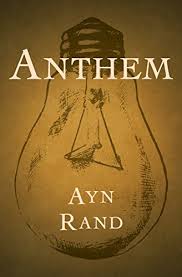Anthem Page #15
Anthem is a dystopian fiction novella by Russian-American writer Ayn Rand, written in 1937 and first published in 1938 in the United Kingdom. The story takes place at an unspecified future date when mankind has entered another Dark Age.
And now I see the face of god, and I raise this god over the earth, this god whom men have sought since men came into being, this god who will grant them joy and peace and pride. This god, this one word: “I.” PART TWELVE It was when I read the first of the books I found in my house that I saw the word “I.” And when I understood this word, the book fell from my hands, and I wept, I who had never known tears. I wept in deliverance and in pity for all mankind. I understood the blessed thing which I had called my curse. I understood why the best in me had been my sins and my transgressions; and why I had never felt guilt in my sins. I understood that centuries of chains and lashes will not kill the spirit of man nor the sense of truth within him. I read many books for many days. Then I called the Golden One, and I told her what I had read and what I had learned. She looked at me and the first words she spoke were: “I love you.” Then I said: “My dearest one, it is not proper for men to be without names. There was a time when each man had a name of his own to distinguish him from all other men. So let us choose our names. I have read of a man who lived many thousands of years ago, and of all the names in these books, his is the one I wish to bear. He took the light of the gods and he brought it to men, and he taught men to be gods. And he suffered for his deed as all bearers of light must suffer. His name was Prometheus.” “It shall be your name,” said the Golden One. “And I have read of a goddess,” I said, “who was the mother of the earth and of all the gods. Her name was Gaea. Let this be your name, my Golden One, for you are to be the mother of a new kind of gods.” “It shall be my name,” said the Golden One. Now I look ahead. My future is clear before me. The Saint of the pyre had seen the future when he chose me as his heir, as the heir of all the saints and all the martyrs who came before him and who died for the same cause, for the same word, no matter what name they gave to their cause and their truth. I shall live here, in my own house. I shall take my food from the earth by the toil of my own hands. I shall learn many secrets from my books. Through the years ahead, I shall rebuild the achievements of the past, and open the way to carry them further, the achievements which are open to me, but closed forever to my brothers, for their minds are shackled to the weakest and dullest ones among them. I have learned that my power of the sky was known to men long ago; they called it Electricity. It was the power that moved their greatest inventions. It lit this house with light which came from those globes of glass on the walls. I have found the engine which produced this light. I shall learn how to repair it and how to make it work again. I shall learn how to use the wires which carry this power. Then I shall build a barrier of wires around my home, and across the paths which lead to my home; a barrier light as a cobweb, more impassable than a wall of granite; a barrier my brothers will never be able to cross. For they have nothing to fight me with, save the brute force of their numbers. I have my mind. Then here, on this mountaintop, with the world below me and nothing above me but the sun, I shall live my own truth. Gaea is pregnant with my child. Our son will be raised as a man. He will be taught to say “I” and to bear the pride of it. He will be taught to walk straight and on his own feet. He will be taught reverence for his own spirit. When I shall have read all the books and learned my new way, when my home will be ready and my earth tilled, I shall steal one day, for the last time, into the cursed City of my birth. I shall call to me my friend who has no name save International 4-8818, and all those like him, Fraternity 2-5503, who cries without reason, and Solidarity 9-6347 who calls for help in the night, and a few others. I shall call to me all the men and the women whose spirit has not been killed within them and who suffer under the yoke of their brothers. They will follow me and I shall lead them to my fortress. And here, in this uncharted wilderness, I and they, my chosen friends, my fellow-builders, shall write the first chapter in the new history of man. These are the things before me. And as I stand here at the door of glory, I look behind me for the last time. I look upon the history of men, which I have learned from the books, and I wonder. It was a long story, and the spirit which moved it was the spirit of man’s freedom. But what is freedom? Freedom from what? There is nothing to take a man’s freedom away from him, save other men. To be free, a man must be free of his brothers. That is freedom. That and nothing else. At first, man was enslaved by the gods. But he broke their chains. Then he was enslaved by the kings. But he broke their chains. He was enslaved by his birth, by his kin, by his race. But he broke their chains. He declared to all his brothers that a man has rights which neither god nor king nor other men can take away from him, no matter what their number, for his is the right of man, and there is no right on earth above this right. And he stood on the threshold of the freedom for which the blood of the centuries behind him had been spilled. But then he gave up all he had won, and fell lower than his savage beginning. What brought it to pass? What disaster took their reason away from men? What whip lashed them to their knees in shame and submission? The worship of the word “We.” When men accepted that worship, the structure of centuries collapsed about them, the structure whose every beam had come from the thought of some one man, each in his day down the ages, from the depth of some one spirit, such spirit as existed but for its own sake. Those men who survived those eager to obey, eager to live for one another, since they had nothing else to vindicate them—those men could neither carry on, nor preserve what they had received. Thus did all thought, all science, all wisdom perish on earth. Thus did men—men with nothing to offer save their great number—lost the steel towers, the flying ships, the power wires, all the things they had not created and could never keep. Perhaps, later, some men had been born with the mind and the courage to recover these things which were lost; perhaps these
Translation
Translate and read this book in other languages:
Select another language:
- - Select -
- 简体中文 (Chinese - Simplified)
- 繁體中文 (Chinese - Traditional)
- Español (Spanish)
- Esperanto (Esperanto)
- 日本語 (Japanese)
- Português (Portuguese)
- Deutsch (German)
- العربية (Arabic)
- Français (French)
- Русский (Russian)
- ಕನ್ನಡ (Kannada)
- 한국어 (Korean)
- עברית (Hebrew)
- Gaeilge (Irish)
- Українська (Ukrainian)
- اردو (Urdu)
- Magyar (Hungarian)
- मानक हिन्दी (Hindi)
- Indonesia (Indonesian)
- Italiano (Italian)
- தமிழ் (Tamil)
- Türkçe (Turkish)
- తెలుగు (Telugu)
- ภาษาไทย (Thai)
- Tiếng Việt (Vietnamese)
- Čeština (Czech)
- Polski (Polish)
- Bahasa Indonesia (Indonesian)
- Românește (Romanian)
- Nederlands (Dutch)
- Ελληνικά (Greek)
- Latinum (Latin)
- Svenska (Swedish)
- Dansk (Danish)
- Suomi (Finnish)
- فارسی (Persian)
- ייִדיש (Yiddish)
- հայերեն (Armenian)
- Norsk (Norwegian)
- English (English)
Citation
Use the citation below to add this book to your bibliography:
Style:MLAChicagoAPA
"Anthem Books." Literature.com. STANDS4 LLC, 2025. Web. 9 Mar. 2025. <https://www.literature.com/book/anthem_329>.








Discuss this Anthem book with the community:
Report Comment
We're doing our best to make sure our content is useful, accurate and safe.
If by any chance you spot an inappropriate comment while navigating through our website please use this form to let us know, and we'll take care of it shortly.
Attachment
You need to be logged in to favorite.
Log In